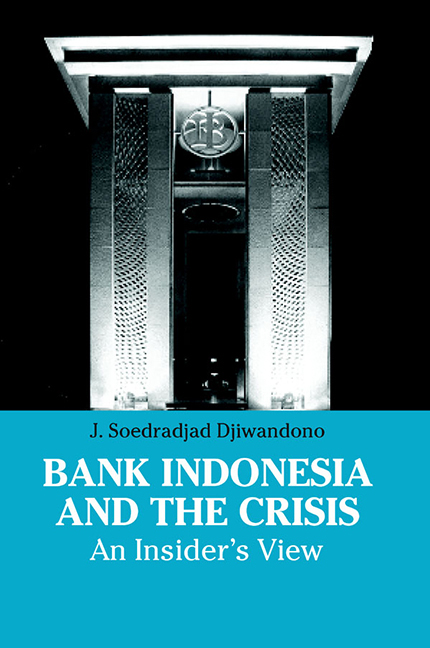Book contents
- Frontmatter
- Dedication
- Contents
- List of Tables
- Acknowledgements
- Glossary
- Prologue: The Crisis and Me
- 1 Introduction
- 2 Origin of the Crisis and Early Responses
- 3 Stabilization and Reform Programmes
- 4 Poor Programme Implementation
- 5 Stronger Programme with Weak Commitment
- 6 Bank Indonesia and the Crisis
- 7 Lessons from the Crisis
- 8 Epilogue
- Postscript
- Notes
- References
- Index
- About the Author
Postscript
Published online by Cambridge University Press: 21 October 2015
- Frontmatter
- Dedication
- Contents
- List of Tables
- Acknowledgements
- Glossary
- Prologue: The Crisis and Me
- 1 Introduction
- 2 Origin of the Crisis and Early Responses
- 3 Stabilization and Reform Programmes
- 4 Poor Programme Implementation
- 5 Stronger Programme with Weak Commitment
- 6 Bank Indonesia and the Crisis
- 7 Lessons from the Crisis
- 8 Epilogue
- Postscript
- Notes
- References
- Index
- About the Author
Summary
Writing this book has taken far too long. Aside from my limited writing proficiency, this has also been due to a variety of reasons including deciding which issues to include, how detailed the discussions should be, the relevance of each issue, and the mentioning of names. In addition, there have been personal problems that have been distracting.
I have spent many days and hours testifying in public hearings in the Parliament and answering questions, the Police Headquarters in the process of interrogations by the Attorney General's Office, or testimonies in courts on cases of alleged corruptions in the provision and utilization of Bank Indonesia liquidity support. From end 1999 to the present all these testimonies and interrogations have cost me months of concentration and writing time. In May 2002, I was myself named as a suspect in a case alleging that, together with other members of Bank Indonesia's board of directors, I violated my authority by providing liquidity support to banks that caused trillion rupiahs worth of losses to the state.
The Indonesian crisis lingers on and recovery seems elusive.
Indonesia has been faring badly in comparison to the performance of other crisis countries that also resorted to the Fund's stand-by arrangements. Thailand, which asked for stand-by arrangement in August 1997, did not need to use the whole facility due to its faster recovery. Korea used up the whole facility. However, Korea has already made repayments on most of the facility (Supplement Reserve Facility) that the country received since December 1997. In the Fund evaluation of its support to the Asian crisis countries in 2000 the concern was for these countries becoming complacent because the Korean recovery happened so fast.
The development of the crisis and its resolution in Korea and Thailand has been in reverse to what happened in Indonesia. If the two other countries no longer need the Fund and the stand-by arrangements, Indonesia is badly in need of both the Fund as well as its support for gaining back market confidence.
By the end of 2000 or two years after the beginning of the IMF's involvement in Indonesia's efforts to address the crisis, Indonesia had experienced four cancellations of its withdrawals of the loan due to non-compliance or delay in the fulfillment of the conditionality.
- Type
- Chapter
- Information
- Bank Indonesia and the CrisisAn Insider's View, pp. 258 - 261Publisher: ISEAS–Yusof Ishak InstitutePrint publication year: 2005

